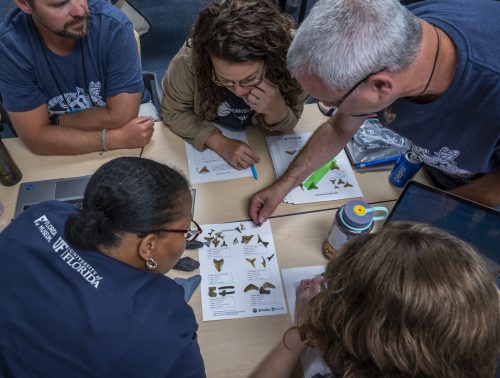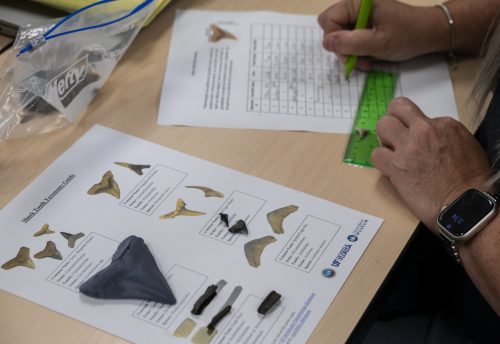Sharks, on their own, are fascinating enough for Florida students in kindergarten through 12th grade. Add artificial intelligence to the study of these creatures and their fossilized teeth, and you get Shark AI – a program that is blending paleontology and cutting-edge technology in STEM curriculums statewide.
Funded by a $1.3-million grant from the National Science Foundation, Shark AI (also known as AI Learning in K-12 with Fossil Sharks) is a collaboration between the University of Florida’s Thompson Earth Systems Institute, UF’s Herbert Wertheim College of Engineering, UF’s College of Education, and St. Mary’s College of Maryland.
The project builds on students’ natural curiosity about sharks while introducing them to customizable, standards-based lessons in computer science, engineering, and technology through tools like interactive machine learning models.
“We believe this foundational knowledge will inspire students to consider careers in STEM,” said Jeremy Waisome, Ph.D., an assistant professor in UF’s College of Engineering and one of the project’s principal investigators. “We hope to understand ways to integrate AI into science classrooms that are accessible, engaging, and exciting.”
 To learn how to implement the Shark AI curriculum, 55 educators throughout Florida have participated in Scientist in Every Florida School professional development workshops on UF’s Gainesville campus for the past three years. Many of the participating instructors teach at Title I schools, which serve low-income communities.
To learn how to implement the Shark AI curriculum, 55 educators throughout Florida have participated in Scientist in Every Florida School professional development workshops on UF’s Gainesville campus for the past three years. Many of the participating instructors teach at Title I schools, which serve low-income communities.
At the heart of the Shark AI project is machine learning – a branch of AI for which computers are programmed to recognize patterns and calculate data. Students learn to program AI algorithms in order to identify different characteristics of fossilized shark teeth, including those from extinct megalodons. Not only does this hands-on experience with AI help demystify the technology, but each teacher also receives a classroom kit filled with actual fossilized shark teeth for the students to explore.
“Sharks are the hook to get students interested and, with their simple morphology, they are easy specimens to identify using AI,” said Bruce MacFadden, Ph.D., the former director of the Thompson Earth Systems Institute and a principal investigator on the project. “Once we have the students’ attention, we will be able to work on how machine learning can help them answer other scientific questions.”
Florida, which is a hotspot for fossilized shark teeth, serves as an ideal backdrop for the Shark AI program. The Florida Museum of Natural History also has a vast collection of tens of thousands of shark specimens for area educators and students to view.
The ultimate goal of the program is to create an AI learning blueprint that can be adopted by schools across the country. Shark AI is just one of many projects under the Scientist in Every Florida School initiative, which was launched in 2019 to foster partnerships between scientists and K-12 educators. 
Since its inception, the initiative has made significant connections across Florida, particularly in Title I schools, facilitating 4,500-plus classroom visits in 64% of Florida’s counties, and reaching more than 188,000 students through engaging virtual and in-person programs.
“With the Shark AI program, using sharks as examples, we hope to dispel some of the myths that go along with AI,” said Victor Perez, Ph.D., a visiting assistant professor at St. Mary’s College of Maryland and a co-principal investigator for the program. “This way, students can better understand possible careers around technology and computer science.”
To learn more about the Scientist in Every Florida School initiative and the Thompson Earth Systems Institute, visit floridamuseum.ufl.edu/earth-systems. The initiative is grateful to Art and Edda Ross for creating an endowment to support the institute’s education and outreach programs. Support classroom visits at ufgive.to/SEFS.
Photos by Erika Nortemann/Florida Museum